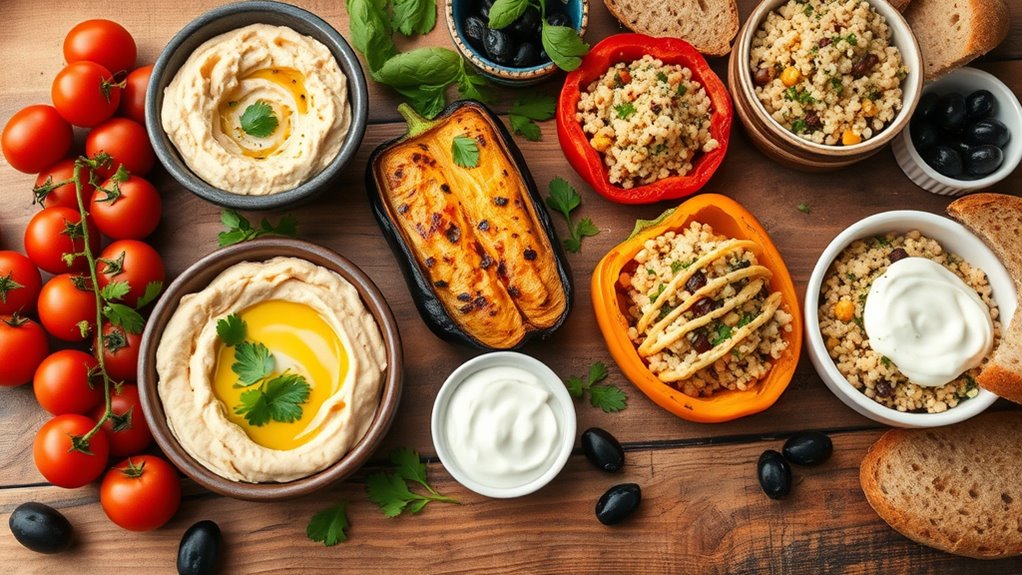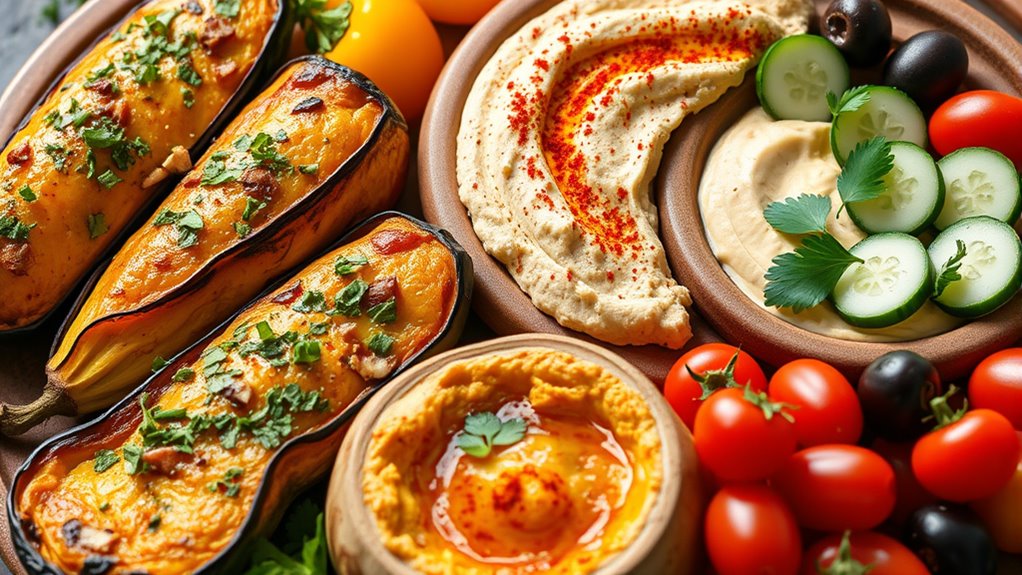Mediterranean-inspired vegetarian dishes focus on fresh ingredients, vibrant flavors, and simple techniques like roasting vegetables with olive oil to enhance their natural sweetness and depth. Incorporate feta cheese, herbs, and wholesome grains such as quinoa or couscous for satisfying, nutrient-packed meals. By emphasizing healthy fats and colorful produce, these dishes are both delicious and nutritious. Keep exploring to discover more tasty ideas and tips for creating your own flavorful Mediterranean veggie meals.
Key Takeaways
- Use olive oil roasting to enhance natural sweetness and smoky flavors of vegetables for vibrant vegetarian dishes.
- Incorporate feta cheese to add salty, tangy contrast in salads and grain bowls inspired by Mediterranean cuisine.
- Combine roasted vegetables with herbs like parsley, dill, or basil to boost freshness and aroma.
- Utilize versatile ingredients such as grains, greens, and cheeses to create hearty, satisfying vegetarian meals.
- Focus on simple, wholesome preparations that emphasize fresh ingredients and bold Mediterranean flavors.

Have you ever wondered how to bring vibrant, healthy flavors to your plate without meat? One of the easiest and most delicious ways is by exploring Mediterranean-inspired vegetarian dishes. These recipes focus on fresh ingredients, bold flavors, and simple preparation methods that highlight the natural goodness of vegetables, grains, and cheeses. You’ll find that with a few key techniques, like olive oil roasting, you can create dishes that are both satisfying and packed with flavor.
Olive oil roasting is a game-changer when preparing vegetables for Mediterranean dishes. Instead of boiling or steaming, tossing vegetables such as bell peppers, zucchini, eggplant, or cherry tomatoes in good-quality olive oil and roasting them enhances their natural sweetness and depth. The process caramelizes the sugars, giving your vegetables a rich, smoky flavor that pairs beautifully with herbs like thyme, oregano, or rosemary. Once roasted, these vegetables can be used as a base for salads, served alongside grains, or layered in wraps. Their vibrant taste and appealing texture make them the star of any vegetarian plate.
Adding healthy fats like olive oil not only boosts flavor but also increases the absorption of fat-soluble vitamins in the vegetables, making your meals more nutritious. Feta cheese salads are another cornerstone of Mediterranean vegetarian cuisine. Crumbled feta adds a salty, tangy punch that balances the sweetness of roasted vegetables or fresh greens. Combine feta with ripe tomatoes, cucumbers, red onions, and olives for a classic Greek salad, or mix it into a bed of arugula and spinach, topped with toasted nuts and a lemon vinaigrette. The cheese’s creamy texture complements the crispness of fresh vegetables, creating a harmonious blend of flavors and textures. Feta salads are not only quick to assemble but also versatile enough to serve as a light lunch or a side dish for dinner.
Beyond salads, you can incorporate these ingredients into hearty grain bowls or stuffed vegetables. For example, roasted vegetables with feta crumbles served over couscous or quinoa make a satisfying meal. Adding herbs like parsley, dill, or basil elevates the freshness and ties the flavors together. This approach emphasizes plant-based ingredients while maintaining the rich, indulgent taste associated with Mediterranean cuisine.
In essence, by mastering techniques like olive oil roasting and incorporating staples like feta cheese into salads, you can craft a variety of vegetarian dishes that are bursting with flavor and nutritional value. These dishes celebrate the Mediterranean’s love for fresh ingredients, vibrant colors, and bold tastes, proving you don’t need meat to enjoy a truly satisfying and delicious meal.
Frequently Asked Questions
What Are Common Herbs Used in Mediterranean Vegetarian Recipes?
You’ll find that basil, oregano, and thyme are common herbs in Mediterranean vegetarian recipes. These herbs pair well with ingredients like tomatoes, eggplant, and zucchini, creating vibrant flavors. During different seasons, you can use parsley in spring, rosemary in winter, and mint in summer to enhance dishes. Incorporate these herb pairings and seasonal herb uses to add freshness and depth to your Mediterranean-inspired meals.
How Can I Make Mediterranean Dishes Vegan-Friendly?
Think of transforming a dish like turning a sailboat into a solar-powered boat—simple, eco-friendly, and effective. To make Mediterranean dishes vegan-friendly, swap dairy with vegan cheese options and use plant-based protein like chickpeas or tempeh. These swaps keep authentic flavor while embracing plant-based ingredients. Experiment, and you’ll discover how delicious and satisfying vegan Mediterranean meals can be, just like the original but kinder to animals and the planet.
Are There Gluten-Free Mediterranean Vegetarian Options?
Yes, you can enjoy gluten-free Mediterranean vegetarian options. Focus on gluten-free grains like quinoa, rice, or millet to serve as a base. Incorporate vegetarian protein sources such as chickpeas, lentils, and nuts to boost nutrition. Fresh vegetables, herbs, and olive oil add authentic flavor. These choices make it easy to create delicious, wholesome meals that are both gluten-free and vegetarian, fitting well within Mediterranean cuisine.
What Are Traditional Mediterranean Vegetarian Breakfast Ideas?
Start your day with a touch of elegance by exploring traditional vegetarian breakfast ideas rooted in Mediterranean breakfast spreads. You might enjoy fresh tomato and cucumber slices paired with warm, crusty bread, or savor creamy hummus with olives and feta for a savory start. Incorporate ripe figs, honey, and nuts for a sweeter option. These dishes celebrate the vibrant flavors and wholesome ingredients that define Mediterranean mornings and elevate your breakfast experience.
How Do I Incorporate Mediterranean Flavors Into Quick Meals?
You can incorporate Mediterranean flavors into quick meals by using spice blends like za’atar or sumac to add vibrant taste. Swap seafood with hearty vegetable or legume dishes, such as chickpea salads or grilled eggplant. Keep ready-made hummus, olives, and feta on hand to enhance flavors quickly. These simple adjustments make your meals flavorful and authentic, all while saving time and satisfying your craving for Mediterranean-inspired cuisine.
Conclusion
As you explore these Mediterranean-inspired vegetarian dishes, you’ll find a delightful harmony of flavors that gently invite your senses to dance. Each bite offers a subtle whisper of sunshine and sea breeze, turning simple ingredients into a warm, welcoming experience. Embrace the chance to indulge in these vibrant, wholesome creations—your palate will thank you for the tender, flavorful journey that leaves a lingering sense of serenity and satisfaction.
Ilana has been a vegan for over 10 years. She originally made the switch for health reasons, but soon found herself becoming more and more passionate about the ethical and environmental implications of a vegan lifestyle. Ilana is the author of The Graceful Kitchen, a blog all about veganism. She loves to cook up delicious and nutritious vegan meals, and share her recipes with others who are interested in leading a cruelty-free life. Ilana is also a strong advocate for using whole foods as the foundation of a healthy diet, and believes that going vegan is one of the best ways to achieve this.










